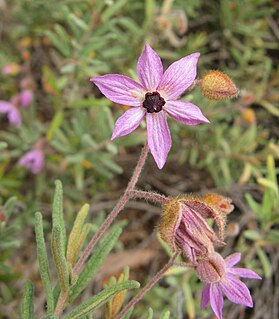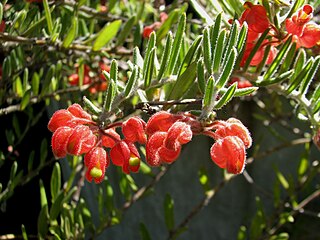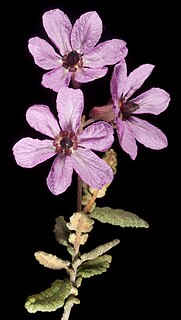
Micrantheum is a genus of plants under the family Picrodendraceae described as a genus in 1818. It is endemic to Australia.
- Micrantheum demissumF.Muell. - South Australia
- Micrantheum ericoidesDesf. - New South Wales, Queensland
- Micrantheum hexandrumHook.f. - Box Micrantheum - New South Wales, Queensland, Victoria, Tasmania
- Micrantheum serpentinumOrchard - Western Tridentbush - Tasmania

Banksia drummondii, commonly known as Drummond's dryandra, is a species of shrub that is endemic to Western Australia. It has pinnatifid to pinnatisect leaves, heads of up to one hundred cream-coloured, red and yellow flowers and glabrous fruit.

Lysiosepalum is a genus of plants in the family Malvaceae, endemic to the south-west of Western Australia.

Grevillea pinaster is a shrub in the family Proteaceae. It is endemic to south-western Western Australia.

Adenanthos meisneri, commonly known as prostrate woollybush, is a species of shrub in the family Proteaceae. It is endemic to the south-west of Western Australia.
Grevillea infundibularis, commonly known as fan-leaf grevillea, is a rare shrub species endemic to Fitzgerald River National Park in south-western Western Australia. It grows to 1 metre high and has fan-shaped leaves and bright red flowers that appear through the year. These are followed by ovoid fruits, about 14 mm long.

Lysiosepalum involucratum is a small shrub species in the family Malvaceae. It is endemic to the south-west of Western Australia. Plants grow to between 0.3 and 1.5 metres high, and produce mauve flowers between August and November in the species' native range.
Palaquium hexandrum is a tree in the family Sapotaceae. The specific epithet hexandrum means "six stamens", referring to the flowers.

Grevillea saccata, commonly known as pouched grevillea, is a shrub which is endemic to the south-west region of Western Australia.

Sinopodophyllum is an herbaceous perennial plant in the family Berberidaceae, described as a genus in 1979. It includes only one known species, Sinopodophyllum hexandrum, native to Afghanistan, Bhutan, northern India, Kashmir, Nepal, Pakistan, and western China. Common names include Himalayan may apple and Indian may apple.
Persoonia bowgada is a species of flowering plant in the family Proteaceae and is endemic to the south-west of Western Australia. It is an erect to spreading shrub with smooth bark, more or less cylindrical leaves and yellow flowers in groups of up to ten on the ends of branches.

Grevillea extorris is a species of flowering plant in the family Proteaceae and is endemic to the west of Western Australia. It is an erect shrub with linear or narrowly oblong leaves and clusters of pink to red or yellow flowers.
Petrophile vana is a species of flowering plant in the family Proteaceae and is endemic to Western Australia. It is a shrub with needle-shaped, sharply-pointed leaves, and spherical to oval heads of small numbers of hairy, white flowers.
Franklandia triaristata, also known as lanoline bush, is a species of flowering plant in the protea family that is found in south-western Western Australia.
Grevillea neodissecta is a species of plant in the protea family that is endemic to Western Australia.
Grevillea neorigida is a species of plant in the protea family that is endemic to Australia. The specific epithet rigida (“stiff”) refers to the stiffness of the leaves.
Grevillea saxicola is a species of plant in the protea family that is endemic to Australia. The specific epithet saxicola refers to the species’ habitat.
Lysiosepalum abollatum, also known as woolly lysiosepalum, is a species of flowering plant in the mallow family that is endemic to Australia.
Lysiosepalum aromaticum is a species of flowering plant in the mallow family that is endemic to Australia.

Lysiosepalum rugosum, also known as the wrinkled-leaf lysiosepalum, is a species of flowering plant in the mallow family that is endemic to Australia.








